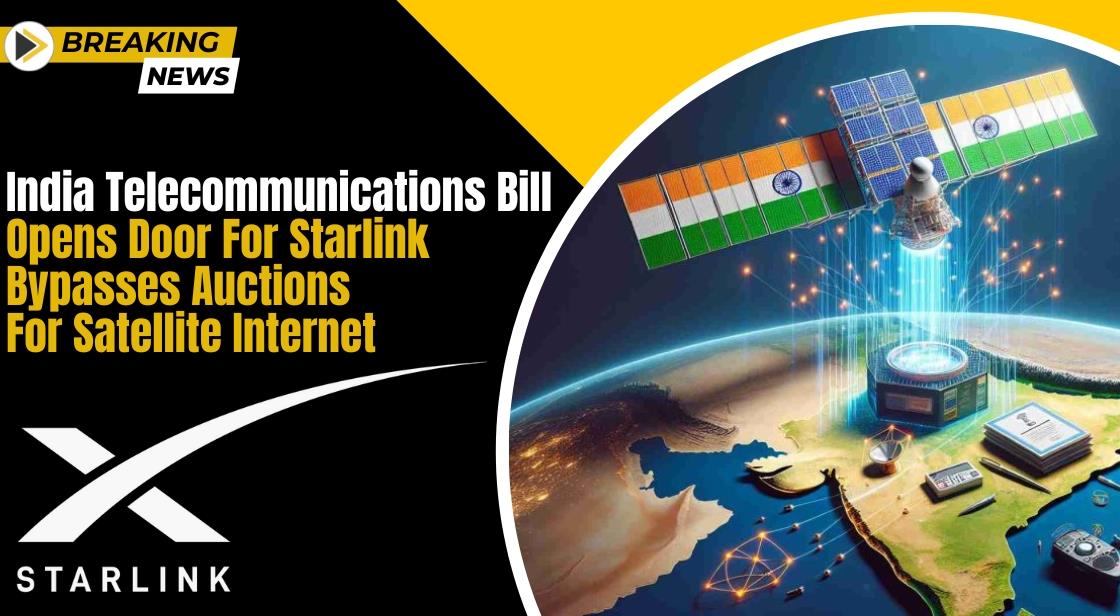India Telecommunications Bill Opens Door for Starlink, Bypasses Auctions for Satellite Internet

News Synopsis
In a significant stride for India's telecommunications landscape, a proposed licensing methodology for spectrum allocation in satellite internet services has emerged, marking a notable victory for Elon Musk's Starlink. This proposal, exempting companies from bidding for spectrum, is a pivotal development following fervent lobbying efforts by Starlink against spectrum auctions.
Proposal Overview in the Draft Bill
Embedded within a fresh draft bill aiming to supplant the archaic 138-year-old Indian Telegraph Act governing the telecommunications sector, this proposition heralds a transformative shift. Presented for parliamentary approval, the draft bill introduces a licensing-based spectrum allocation system, altering the existing norms.
Foreign Firms' Advocacy and Concerns
Foreign entities have advocated for a licensing approach, expressing concerns regarding India's potential auction system. There's apprehension that such auctions, distinct from practices elsewhere, might set a precedent, prompting other nations to follow suit. This could potentially escalate costs and necessitate substantial investments, as previously reported in June.
Divergent Perspectives: Reliance Jio's Stand
Contrary to the stance of foreign firms, Reliance Jio, India's leading telecom operator, has advocated for an auction-based spectrum distribution. Drawing parallels to the distribution model for 5G spectrum in India, Reliance contends that a fair playing field necessitates an auction. The involvement of foreign satellite service providers in offering voice and data services intensifies the call for a leveled competitive landscape.
Industry Insights and Market Projections
Anil Prakash, Director General at SIA-India, a satellite industry body, underscores the pragmatic approach of bypassing traditional auctions. This strategy, he notes, stands poised to streamline the deployment of satellite services, enhancing efficiency in the process.
Growth Projections for Satellite Broadband Market in India
Deloitte's forecasts paint a promising picture for India's satellite broadband service market, anticipating a robust 36% annual growth trajectory, projecting a valuation of $1.9 billion by 2030. This projection underlines the burgeoning potential and viability of satellite-based internet services within the Indian market.
Broadened Powers: National Security Measures
In addition to spectrum allocation reforms, the draft telecom bill extends the government's authority. It empowers the government to potentially suspend or prohibit the utilization of telecom equipment from specific countries on grounds pertaining to national security, signaling a proactive stance in safeguarding national interests.
Reshaping India's Telecommunications Landscape
India's proposed telecommunications draft bill signifies a pivotal juncture in the evolution of the sector, particularly in the context of satellite-based internet services. The shift towards a licensing approach and the broader implications for foreign firms, spectrum distribution, and market growth underscore a dynamic transformation within the nation's telecom industry.
Beyond Starlink:
-
Potential Global Impact: India's decision to bypass auctions might influence other countries to follow suit, leading to a ripple effect on global spectrum allocation policies.
-
National Security Concerns: The draft bill also empowers the government to restrict or ban telecommunications equipment from specific countries based on national security considerations. This opens the door for potential political influence and equipment restrictions.
You May Like









